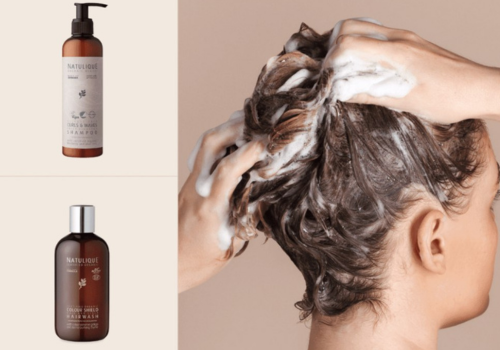When it comes to caring for your hair, the water you use is often overlooked, even though it has a significant impact on hair health. Hard water, in particular, can pose a variety of both aesthetic and structural problems for your hair. In this article, we'll explore the impact of hard water on your hair and explain how you can take steps to mitigate its effects.
Understanding hard water and its impact on hair
Definition of hard water
Hard water is essentially water containing a high concentration of dissolved minerals, mainly calcium and magnesium. These minerals can interact negatively with hair products and affect the texture and natural health of your hair.
Importance of pH and minerals in water
The pH of water plays a crucial role in its interaction with hair. Hard water often has a higher pH, which can open up the hair cuticle, making it more vulnerable to damage. Finally, the minerals contained in hard water can bind to the hair, weighing it down and causing residues that can dull and dry hair.
Impact of hard water on hair health
The effects of limescale on hair
One of the main components of hard water is limescale. When limescale builds up on the surface of the hair shaft, it can cause a number of problems, including reduced shine, elasticity and strength. Hair can become more difficult to style and more brittle over time.
Effects of hard water on hair color and texture
In addition to limescale, other minerals present in hard water can also interact negatively with hair dyes. They can lead to faster fading of dyes, as well as changes in texture. As a result, frizz, lack of softness and split ends are problems that many people associated with hard water use frequently notice.

Signs that your hair is affected by hard water
Common symptoms of exposure to hard water
When it comes to identifying the problems that hard water can cause your hair, some signs are more common than others. Recognizing these symptoms can help you take steps to protect and improve the health of your hair.
Dry, brittle hair: risk factors
Dry, brittle hair is often one of the first signs of prolonged exposure to hard water. The minerals present in hard water, such as calcium and magnesium, settle on the hair cuticle, preventing moisturizing products from penetrating properly. This can make hair stiff and prone to breakage more easily. People with naturally fine or fragile hair may be particularly vulnerable to this problem, accentuating the damaging effects of hard water.
Hair discoloration: relationship with hard water
Another frequent consequence of exposure to hard water is hair discoloration, which often affects those who dye their hair. Minerals can accumulate on the hair fiber, interfering with color pigments and resulting in dullness or a dull hue. For blond hair, this can mean a coppery or yellowish tint, while brown or red hair can lose its shine.
Diagnosis: How to know if water is the cause of your capillary problems
If you suspect that your capillary problems are due to hard water, there are several methods that can help you confirm this diagnosis, so that you can take appropriate corrective action.
A simple way to tell if you're using hard water is to check your appliances. Visible limescale deposits on your showerheads, faucets and bathtub walls are obvious indicators. You can also buy test strips to check the hardness of the water in your home.
If you already feel that your hair is suffering for no apparent reason, consult a hair specialist. These experts can perform specific tests to analyze residues on your hair and provide a precise diagnosis. What's more, they'll be able to advise you on suitable treatments and care to limit the effects of hard water.
In a domestic context, observing the texture and reaction of your hair after washing can give clues. If you notice less consistent foamy emulsions with your hair products, or an increased need for hydration, this may be linked to hard water.
Ultimately, correctly identifying hard water as a source of problems is essential to reversing the effects and restoring your hair's vitality. Deepening your knowledge of the symptoms gives you an edge in opting for the best solutions available.
See also: How do you achieve even bleaching all over your hair?
Tips and solutions for protecting hair from hard water
Preventing damage caused by hard water
Preventing hard water damage is essential to maintaining healthy, radiant hair. By adopting judicious practices and adjusting your hair routine, you can mitigate the undesirable effects of hard water on your hair.
Considerations for hard water hair care products
The choice of hair care products plays a crucial role in protection against hard water. It's important to select shampoos and conditioners specially formulated to combat the effects of hard water. These products often contain chelating agents that prevent the formation of mineral deposits on the hair cuticle. In addition, clarifying shampoos used once a week can help eliminate mineral residues, leaving your hair lighter and refreshed.
In addition, choosing sulfate-free products is also beneficial, as they are less aggressive and help preserve hair's natural moisture, reducing the risk of dryness and breakage.
Measures to reduce exposure to hard water
Reducing exposure to hard water can start with simple but effective solutions that minimize the daily damage to your hair. Installing a home water softener is a popular option. This device reduces the mineral content of your water, making each wash less harsh on your hair and skin.
For those looking for a more affordable solution, showerhead filters are an excellent alternative. These filters are designed to remove some of the minerals present in the water, offering extra protection with every wash. Specific hair filters are also available, adding an extra layer of protection against hard water.
Finally, if you have the opportunity, washing your hair with purified or distilled water greatly reduces mineral exposure, and can be easily integrated into your hair care routine.
Treatments and solutions to combat damage
Combating hard water damage also requires targeted treatments and customized solutions to repair and revitalize your hair.
Deep moisturizing treatments, such as nourishing hair masks, are essential for restoring hair's natural moisture. Applying a mask once a week strengthens hair fibers and provides essential nutrients that help limit the effects of limescale and other harmful minerals.
Opting for natural hair oils can also help seal in moisture. Argan, coconut and sweet almond oils protect hair by forming a protective barrier against external aggressors, making them particularly suitable for hair subjected to hard water.
In addition, adjusting drying techniques can complement your efforts. Avoid rubbing hair with a towel, preferring to pat it gently with a microfiber cloth. This minimizes friction and reduces the risk of breaking already fragile hair.
By exploring these tips and solutions, you can take control of the consequences of hard water and keep your hair healthy, shiny and strong.
Part Four: Professional Treatments and Advanced Diagnostics
Professional solutions to counter the impact of hard water
For those seeking more advanced solutions to mitigate the effects of hard water on their hair, several effective professional treatments are available. Hair salons offer specialized services that can bring significant and lasting relief to affected hair.
Keratin treatments and Brazilian straightening
Keratin treatments, such as Brazilian straightening, are popular for rebuilding and smoothing hair fiber. By infusing hair with keratin, these treatments reduce frizz and make hair shinier and more manageable, even in the presence of hard water.
Intensive moisturizing care sessions
Intensive moisturizing salon treatments can also be very beneficial. These sessions use professional nourishing products that penetrate deep into the hair fiber. With visible results after just a few sessions, hair often regains its suppleness and shine.
Advanced diagnostics to assess damage
To identify exactly how much damage hard water may have done to hair, some salons and dermatologists offer advanced diagnostics. These professional assessments enable treatments to be tailored to each individual's specific hair needs.
Analysis of capillary structure
Hair can be examined at a submicroscopic level using state-of-the-art technology. This allows the presence of microscopic mineral residues to be detected and the degree of porosity to be determined, which can influence the treatment approach to be adopted.
Personalized consultations with hair experts
Meeting with a hair expert for a personalized consultation can provide valuable insights into the condition of your hair. These professionals offer tailor-made advice on product selection and maintenance routines, taking into account the impact of hard water on your hair.
FAQ
What are the signs that the water is too hard for my hair?
Signs such as dull, brittle or frequently tangled hair can indicate the presence of hard water. If your hair color fades quickly, this can be another indicator.
Are shower filters effective against hard water?
Yes, shower filters can reduce the minerals in water, thus mitigating the impact of hard water. Although they don't eliminate it completely, they significantly reduce exposure to these minerals.
Do water softeners have an immediate positive effect on hair?
Installing a water softener can gradually improve hair condition by reducing water hardness. Benefits include fewer mineral deposits and less coarse hair.
How often should I use a clarifying shampoo?
To counter the effects of hard water, a clarifying shampoo can be used once a week to remove mineral build-up that weighs hair down.
Can at-home hair treatments compete with salon solutions?
While at-home products can alleviate some of the effects of hard water, salon treatments often offer faster, more visible results thanks to more concentrated, professionally executed formulas.
Hard water can be a formidable adversary to hair health, threatening texture and shine. However, by combining home care with professional treatments, it's entirely possible to protect and revitalize your hair. Whether it's adjustments to your hair care routine or professional intervention, there are many approaches you can take to mitigate the effects of hard water. A thorough understanding of the symptoms and solutions available will enable you to make informed decisions to preserve the beauty of your hair over time.




